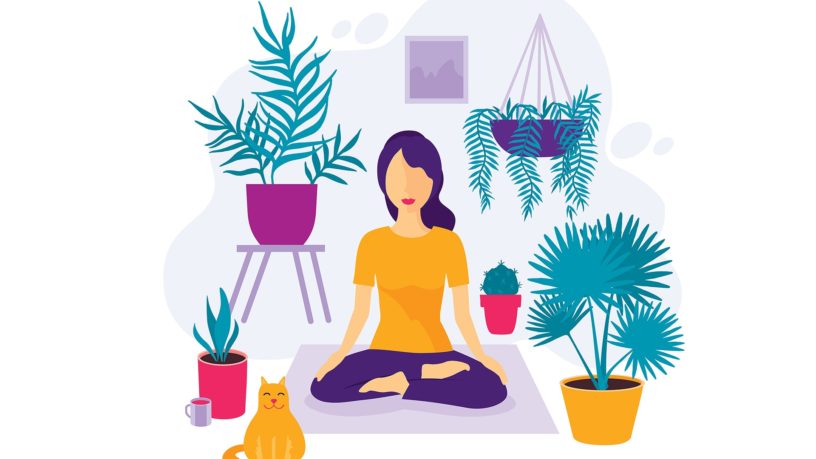Meditation has been practised since ancient times, from the yogis and sadhus to Shamans circa 1500 B.C., who learned to raise their consciousness above the physical levels to higher realms of consciousness. It forms an integral part of the world’s major religious traditions.
Hinduism has made an invaluable contribution to world civilization in the form of meditation. The Hindi word “yoga” means “union” and the various methods of yoga are aimed at bringing one to realise the unity of the individual soul and the Divine. This practice is recommended in the Ashtaang Yoga (eight limbs of yoga) of the Devi Gita that recommends dhyaan (maintenance of unity of the individual soul and super soul through meditation) and dhaarana (deep contemplation with equilibrium of mind). These practices are routes to inner transformation.
There are many meditation schools, philosophies, experts and organisations. Some schools teach that we should contemplate nothingness or emptiness while others teach the use of a virtue, a mantra, a colour, a sound, one’s breathing, a feeling or form. These varied practices are usually linked by a mindful connection to that which is greater than oneself. Spiritual practitioners often meditate as a way of stilling the thoughts that emerge from the mind and so connect with the Divinity within us. However, there are also many psychological, physical and social benefits of meditation.
Psychological Benefits of Meditation
Meditation settles our thoughts and emotions. It can help most people feel less anxious and more in control. It can also bring about personal insight and self-understanding.
Meditation exercises are sometimes forms of imagery and visualisation that are useful in healing old traumas, confronting death and anxieties, bringing closure, learning to forgive and enhancing self esteem.
Meditation frees people from preoccupation with the past and future and allows them to fully experience life’s precious moments with joy, peace and enthusiasm.
Feelings of helplessness, hopelessness and isolation are signs of depression. Meditation increases self confidence and feelings of connections to others. Many studies have shown that depressed people feel much better after eliciting the relaxation response. Meditation teaches you to remain calm in most situations.
Meditation develops intuition, that is, a capacity to understand and foresee.
Relaxation, increased awareness, mental focus and clarity, and a sense of peace are common by-products of meditation.
Deep meditation becomes a transcendent habit of mind, a way of seeing beyond what Albert Einstein called “the optical illusion” of individual consciousness to the higher, more universal ground of existence.
It is said that meditation may improve one’s mental abilities: increased intelligence and creativity; improved learning ability, memory and reaction time; higher levels of moral reasoning, improved academic performance, greater orderliness of brain functioning and increased self-actualisation.
Physical Benefits of Meditation
Many diseases stem from the discord between the mind and body. Meditation will bring your body, mind, emotions and spirit, all the facets of human existence, into harmony. It soothes the nervous system and lets your body unwind from stress. Regular meditation practice is even said to rewire the brain.
Meditation helps in lowering blood pressure as it relaxes the body. Studies show that meditation may decrease the risk of heart disease, possible because the resulting stress relief allows the body to heal naturally and reduce the number of complications related to stress. In fact, it is said that meditation can be an important complement to traditional medical treatment for depression, anxiety, hypertension, cardiac arrhythmias, chronic pain, migraine headaches, insomnia and many other conditions. It has been used to reduce side effects of chemotherapy, minimise post-operative pain, alleviate symptoms of premenstrual syndrome and has been used together with fertility treatments.
Deep meditation has been characterised by distinct changes in metabolism, heart rate, respiration, blood pressure and brain chemistry.
It is said that meditation has improved health in several ways: reduced stress and anxiety, reduced hospitalisation, reduced incidence of disease, reduced need for outpatient medical care, reduced health care costs, reduced use of alcohol and drugs, improved cardiovascular health, reduced physical complaints and increased longevity.
Social Benefits of Meditation
Meditation brings about feelings of contentment and wellbeing, which help us to cope with the busyness and difficulties of daily life.
As we practice meditation, difficult situations might become easier to deal with. We shall feel naturally warm and well-disposed towards other people and our relationships with others will improve.
Meditation encourages deeper understanding of yourself and others. Thus you will follow your chosen path with more precision. It will be easier for you to stand up for yourself and, therefore, your relationships with others will improve.
Social benefits can include improved self confidence, reduced anxiety, improved family life, improved relationships at home and at work, increased tolerance, improved job performance and increased job satisfaction.
Meditation, one of Hinduism’s many gifts to the world, can be a vehicle for personal and national transformation.



